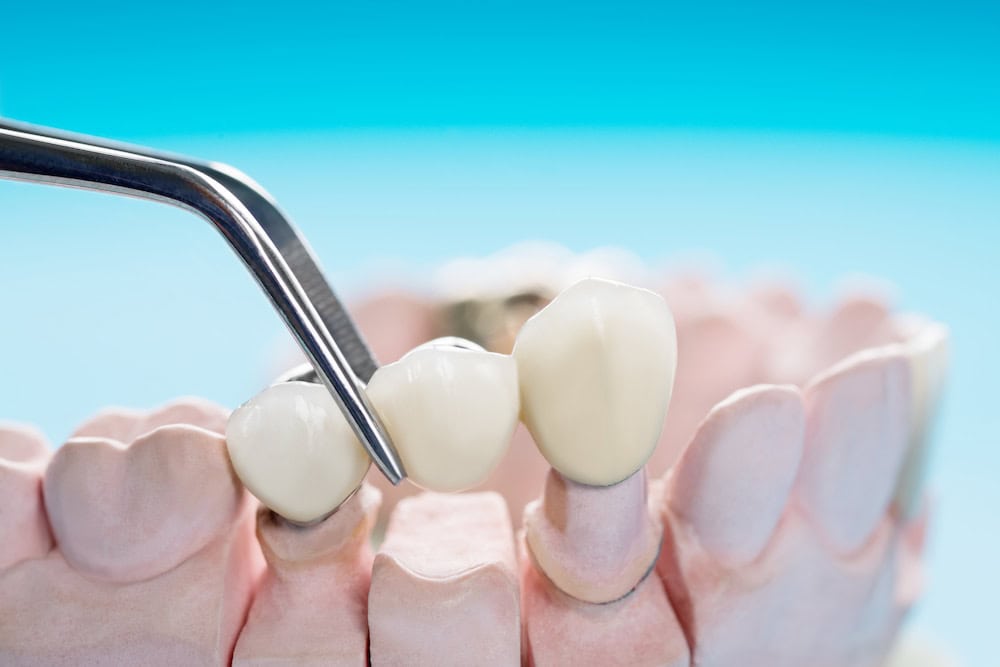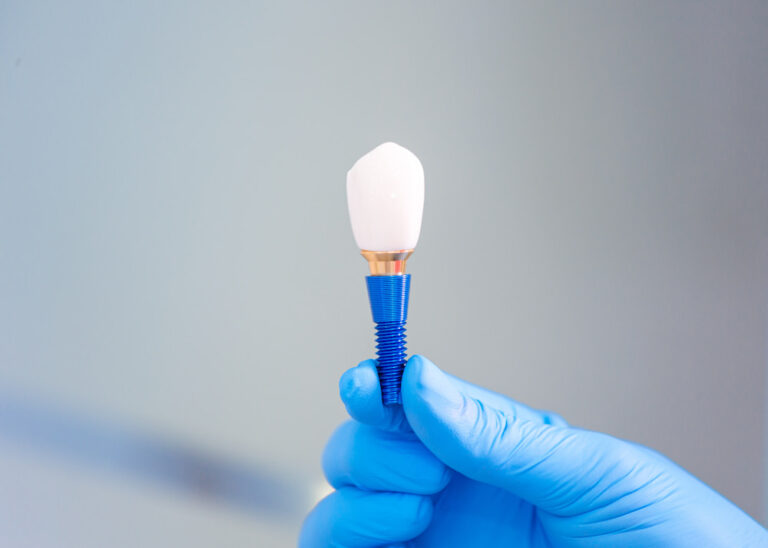Nowadays, people generally have two options when they need to replace one or more missing teeth: a fixed bridge or a dental implant. We’ll explain both of these options in detail, as well as list the pros and cons of each, so you can make an educated decision on which option is better for your particular case and lifestyle.
We’ll also discuss the relative permanence and costs of dental implants and fixed bridges, as these factors can also affect your decision. Let’s start by explaining each of the treatments.
Table of Contents
ToggleDental Implant
Dental implants have surpassed dental prosthetics and dentures as the most popular replacements for missing teeth. A dental implant consists of three connected parts: the implant, an abutment, and the crown. The implant is typically a titanium screw that’s inserted into the jawbone in the space where the missing tooth was. Depending on the complexity, the implant procedure is typically completed in two to four steps.
In the first step, the dentist makes an incision into the gum tissue, inserts the implant into the jawbone, then allows the wound to heal and the implant to stabilize and fuse with the jawbone. They may also augment the bone tissue by doing a bone graft that provides more area surrounding the implant. The healing can take from 4 to 6 months before the jaw is ready for the second step.
In the second step, the dentist attaches the abutment to the top of the screw. This is a failsafe device that can be disconnected from the implant and crown, allowing the implant to remain in the jaw in case of damage to the crown. The crown is also generally attached during the second step to finish the total implant procedure.
Fixed Bridge

Fixed bridges are the most requested alternatives to dental implants. The name “fixed bridge” basically describes the treatment. The bridge has a dental crown and prosthesis on it and spans the gap left by the missing tooth. The bridge is fixed and anchored to the two teeth on either side of the gap.
However, this necessitates altering the two teeth on either side of the gap to serve as anchor points for the bridge. The teeth are filed down and covered by matching crowns attached to the bridge.
Pros and Cons of Dental Implants vs. Fixed Bridges
While both of these treatments are considered to be far superior to dentures or removable prosthetics, they do have some advantages and drawbacks that people need to be aware of.
Pros and Cons of Dental Implants
One of the major pros of dental implants is their permanence. They can last for 15 years or more. They also don’t affect the teeth around the implant the way dental bridges do, and they have a 97% success rate.
The cons are the higher up-front costs. A single dental implant can cost twice the price of a single fixed bridge. The dental implant procedure also takes much longer to complete than a fixed bridge, with months of healing in between the first two steps. The surgical nature of the procedure can also lead to complications.
Pros and Cons of a Fixed Bridge
The pros of undergoing a fixed bridge treatment are the lower up-front costs and the fact that they don’t require bone grafting or invasive surgery. They are also much faster to install. A fixed bridge can typically be installed in two to three visits within as little as a week.
The cons of a fixed bridge are that it has to be replaced every 5 to 7 years, which may lead to higher overall costs. The bridge can also create more cavities and problems in surrounding teeth, and they can lose their natural look over time.
Choosing Between a Fixed Bridge vs. a Dental Implant
There are many other things to keep in mind when making a decision between the two types of tooth replacements. The cost, time required to complete the treatments, and levels of complexity involved can be a factor, especially when you have more than one tooth to replace. Your general health is also a factor if you plan on undergoing the surgery required for a full-mouth dental implant within a short period.
If you’re having trouble deciding between these two treatments or have some questions you’d like to ask, schedule an appointment for an examination and consultation at either of our About Tooth Dental Clinics in Bangkok. We’ll help you decide which treatment is right for you.

Dr. Papatsara Veerapol, D.D.S. is a dentist specializing in orthodontics, dental implants, and prosthodontics (veneers, dentures). She graduated with honors (Second Class) from the Faculty of Dentistry at Chulalongkorn University. She later earned a Master’s degree in Prosthodontics from Srinakharinwirot University. With extensive work experience, she holds an Advanced General Dentistry Certificate and is certified as a Platinum Provider of Invisalign for 2021 and achieved Zenyum Star Tier status in 2023.
Currently, she is the founder of About Tooth Dental Clinic, which was honored with the World Class Award 2021 in the category of The Best of International Healthy Business. She also serves as a member of the Thai Association of Dental Implants (TADI) and the Thai Prosthodontics Association.
